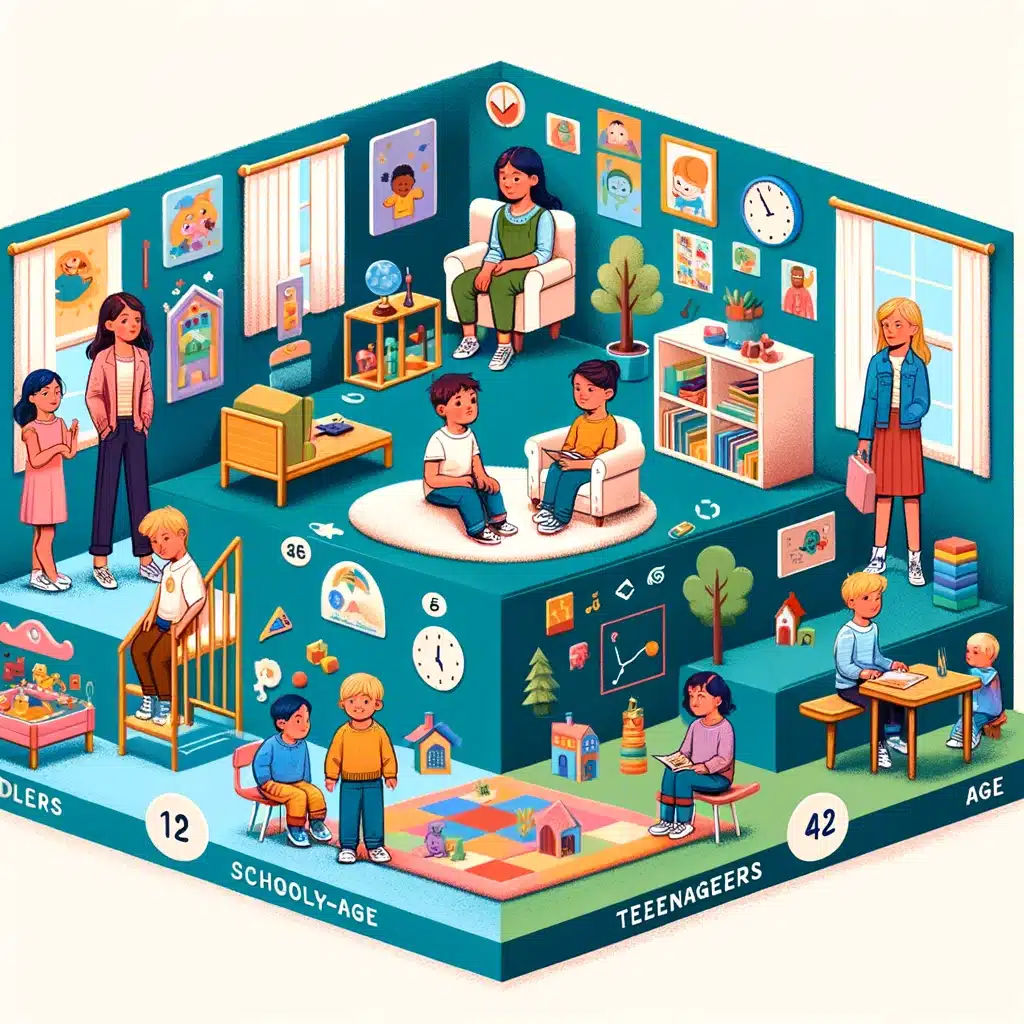Picture this: You’re on a rollercoaster, racing through twists and turns, heart pounding, and adrenaline surging. Now, envision that rollercoaster isn’t constructed of steel and tracks. Rather, it embodies the real-life rollercoaster of Texas Child Protective Services (CPS) cases. Sounds exhilarating, right? In this blog post, we’ll take you on a wild journey through understanding final hearings in Texas CPS cases and child custody and best interests across different ages.

Short Answer: So, what’s the deal with Texas CPS cases? They’re a complex maze of legal battles, emotions, and crucial decisions that determine the future of families and children. But fret not, because we’re here to make this rollercoaster ride an enjoyable and enlightening one!
Now, grab your virtual ticket, and let’s dive into the thrilling world of Texas CPS cases. We promise you’ll want to keep reading to uncover the secrets, challenges, and triumphs that make up this heart-pounding ride!

Buckle Up: Navigating the Wild Ride of Texas CPS Cases
Once your CPS case is filed, it has a one-year limit before reaching its conclusion. Initially, this might seem like a lengthy period to wait for resolution. However, if you’ve been following our blog recently, you can understand the multitude of steps involved in this process. Both you and the court have numerous tasks to complete before determining a permanent home for your child.
The goal of a final hearing (trial) in a Child Protective Services case is to identify a permanent home for your child. It is also done to resolve any outstanding issues for the parties to your case. Once the Department of Family and Protective Services has been appointed as the temporary managing conservator of your child, it must conclude the case within that year. Without a court order stating otherwise, the first Monday after the expiration of one year will see the case dismissed.
Are extensions ever granted in Child Protective Services cases?
The judge in your case must determine the presence of extraordinary circumstances for your case to extend past the one-year deadline. An extension of up to six months is possible. Keep in mind that this is a long time for your child to be out of your home and in the temporary care of the Department of Family Protective Services. Even if your child is staying with a relative or other person close to your family this is a very long time for your child’s fate to be up in the air.
If the judge retains your case on their docket, they will issue an order scheduling the new dismissal date if a trial hasn’t commenced. Additional temporary orders concerning the safety and welfare of your child are likely to be issued. Odds are that your child’s circumstances will have changed in the almost one year that he or she has been in the custody of the Department.
What happens if your Child Protective Services case is dismissed?
In most instances, a court will set a case for trial and then set the dismissal date for the case. If the judge grants an extension in your case but a trial doesn’t commence before the dismissal date, the court loses jurisdiction over you and your child. The Department’s lawsuit will be terminated, and the case is dismissed without further action required from the court.
What does this mean for you and your child? In most cases, you and your child will revert to the same positions you were in before the lawsuit was filed. It’s important to note that just because the Department of Family and Protective Services can no longer bring a lawsuit, other parties to the case, such as an intervening grandparent, may continue with their own legal action against you.
Furthermore, the Department can file a new petition after its original lawsuit is dismissed. However, a new lawsuit cannot rely on circumstances that occurred a year ago. The current situation in your home must provide evidence that there is a continuing danger to your child if they return home with you.
You, as the parent, usually become the managing conservator of your child, unless demonstrating otherwise would harm your child’s physical health or emotional development. Past termination cases cannot affect your current case. If a trial doesn’t commence by the dismissal deadline and your case is dismissed, your child’s return home with you hinges on your current circumstances.
Your child can come home at any point in your case- with conditions
In some circumstances, the Department may allow your child to leave their temporary custody and return home to you. If this occurs, they would need to go before the judge and seek a court order that grants you this right. A monitored return home for your child may be the result of that hearing. The return cannot last more than 180 days, however.
To grant a monitored return home, the judge must determine that the court still retains jurisdiction over what is in the best interests of your child. This essentially means that the court case will proceed until further order of the court. Once established, the court will issue an order mandating the return of your child to your home and removing them from the temporary care of the Department of Family and Protective Services.
Following this, a transition plan will be established for your child, and its implementation will be scheduled as determined by the Department and the Court. This transition will entail your child moving from the transitional housing they have resided in throughout the case back to your home. Concurrently, you will bear the responsibility of fulfilling any remaining requirements specified in your service plan.
Throughout this transitional period, the Department will retain its role as the temporary managing conservator of your child. This entails their oversight of your child’s return to your home to ensure that it remains a safe and suitable environment. In certain situations, you may find it necessary to request an extension of up to six months to address any outstanding components of your service plan.
What happens in the event that the monitored return of your child does not go well?
If the Department determines before your lawsuit is dismissed or a trial begins that your child must be removed from your home, the court will determine a new dismissal date.
What will happen in the final hearing of your case?
In a Child Protective Services (CPS) case, Knowing your rights is crucial, especially when it comes to Signing Documents. During a final hearing (trial), the court has several options at its disposal. One option is to enter a final decree of conservatorship that returns your child to your home, effectively dismissing the Department from further involvement with your child and you. Another possibility is the entry of a final decree of conservatorship that grants permanent managing conservatorship over your child to a relative, which may or may not involve the termination of your parental rights. Alternatively, the court may opt to enter a final decree of conservatorship designating the Department as the permanent managing conservator of your child, a decision that could, in some circumstances, lead to the termination of your parental rights.
What does the Department have to prove in a final hearing?
The Department of Family and Protective Services must demonstrate whether your parental rights should be terminated or if the Department should be appointed as the managing conservator of your child. If yours is a termination lawsuit then the Department must convince a judge that there is a clear and convincing reason (evidence) related to at least one ground for termination and that termination of your parental rights is in the best interests of your child.
What are the grounds for parental rights termination in Texas?
To start, you must receive notice of a lawsuit filed against you seeking to terminate your parental rights. If you are not personally served in this lawsuit, any court terminating your parent-child relationship cannot appoint the Department of Family and Protective Services as the permanent managing conservator of your child. Two exceptions to this rule apply: when the Department demonstrates diligent effort to locate you, and any relative located by the Department has had a reasonable chance to request appointment as a managing conservator of your child.
|
Grounds for Termination |
Explanation |
|---|---|
|
Abandonment of Child |
Leaving a child alone or with another person for an extended period without returning or providing support. |
|
Child Abuse or Neglect |
Engaging in abusive or neglectful behavior towards the child, causing harm or endangerment. |
|
Abandonment of Pregnant Mother |
Abandoning the pregnant mother of the child, potentially leaving her without support or care during a critical time. |
|
Criminal Convictions |
Being convicted of certain serious crimes, such as capital murder, manslaughter, sexual assault, child pornography possession, or indecency with a child. |
Your parental rights in relation to your child can be terminated against your will
There are a number of circumstances that can act as the basis to have your parental rights related to your child terminated against your will. Voluntarily leaving your child alone or in the care of someone who isn’t the parent, and subsequently expressing a desire not to return, can lead to the termination of your parental rights. This is particularly true if you remained away from your child for at least three months and did not provide adequate support during your absence.
In addition to the foregoing, several other circumstances could result in the termination of your parental rights. The majority of which revolve around abandoning your child, abusing your child, neglecting your child or abandoning the pregnant mother of your child. Being convicted of a host of crimes could also serve as grounds for the termination of your parental rights. Capital murder, manslaughter, sexual assault, possession of child pornography and indecency with a child being foremost among them.
What grounds are not viable for basing a termination lawsuit on?
On the other hand, there are specific grounds that the Texas Family Code details cannot be the basis for a petition to terminate your parental rights. Your having homeschooling your child, you’re being economically disadvantaged, or declining to immunize your children for reasons related to conscience are three of the more frequently cited reasons.
When would the court determine that you are unable to care for your child?
The court can specify the inability to care for your child as a reason to terminate your parental rights. Typically, this inability stems from a diagnosed mental disability. If the Department of Family and Protective Services files a lawsuit, the judge can order the termination of your parental rights under certain conditions.
First, authorities must determine that you have a mental or emotional illness that renders you unable to provide for the physical, emotional, and mental needs of your child. This illness must be likely to continue until your child’s 18th birthday. Furthermore, the Department must have served as the temporary or sole managing conservator of your child for at least six months before the termination hearing.
If the court determines that terminating your parental rights is in the best interests of your child, they will be terminated. You will have the benefit of an attorney ad litem appointed by the judge to represent your interests in such a termination lawsuit.
Understanding Final Hearings in Texas CPS Cases
In the complex world of Child Protective Services (CPS) cases in Texas, final hearings play a pivotal role in determining the fate of children and families involved. This article aims to unravel the intricate web of final hearings in Texas CPS cases, shedding light on the various aspects that come into play during these crucial proceedings. So, fasten your seatbelts as we embark on this journey of understanding final hearings in Texas CPS cases.
Role of Attorneys
When it comes to CPS cases, attorneys are the unsung heroes who navigate the legal labyrinth on behalf of parents and advocate for the best interests of the child. They are the legal beacons who offer guidance, representation, and support to parents embroiled in CPS cases. Attorneys play a pivotal role in presenting their client’s case, ensuring due process, and fighting for reunification where appropriate.

Counseling and Therapy
Counseling and therapy are not merely buzzwords in CPS cases; they are lifelines for parents and children alike. These services offer a pathway for parents to address the issues that led to CPS involvement and demonstrate their commitment to change. Compliance with therapy can significantly impact the case’s outcome, showing the court that parents are actively working towards creating a safe and nurturing environment for their children.
Foster Care
The Texas foster care system provides temporary shelter and care for children removed from their homes due to safety concerns. Foster parents step in as nurturing figures during this challenging period. Understanding the rights of foster parents and the process of reunification with biological parents is crucial for all parties involved.
Child’s Voice
In Texas CPS cases, the child’s voice carries weight. Courts consider the preferences and feelings of children, particularly older ones, when making decisions about their placement. Ensuring that children feel heard and understood is an integral part of the CPS process.
Kinship Care
Kinship care offers an alternative to traditional foster care. In kinship care, relatives step up to provide temporary custody to the child, often minimizing the trauma of separation from the family. Understanding the nuances of kinship care and how it differs from traditional foster care is vital.
Supervised Visitation
Supervised visitation is a structured process that allows parents to spend time with their children under the watchful eye of a professional. This arrangement ensures the child’s safety while allowing parents to maintain their bond during the CPS case.
Parenting Classes
Parenting classes are a valuable resource for parents involved in CPS cases. These classes offer guidance on improving parenting skills, making it easier for parents to regain custody of their children.
Mediation and Alternative Dispute Resolution
In some instances, mediation or alternative dispute resolution methods can help resolve CPS cases outside of the courtroom. These processes can save time and resources while working towards solutions that benefit both parents and children.
Appeals Process
If a party disagrees with the court’s ruling in a CPS case, they have the option to pursue an appeal. Understanding the appeals process and the grounds for appeal is essential for anyone navigating the CPS system.
Resources for Parents
Parents facing CPS involvement often need support and resources to help them through this challenging time. There are various support groups, legal aid services, and community organizations that can assist parents in their journey to reunification.
Impact on Children
The impact of CPS involvement on children’s mental and emotional well-being can be profound. It’s crucial to address these potential long-term effects and discuss strategies for mitigating them to ensure children can thrive despite the challenges they face.

Preventive Measures
Lastly, let’s explore preventive measures that parents can take to avoid CPS involvement altogether. Creating a safe and stable home is key to keeping families together and children out of the CPS system.
Understanding final hearings in Texas CPS cases is not just about legal proceedings. It’s about grasping the entire ecosystem in which these cases unfold. From the critical role of attorneys to the impact on children’s lives, each aspect contributes to the intricate tapestry of CPS cases. By delving into these topics, we hope to shed light on a complex system, making it more accessible and understandable for everyone involved.
Conclusion: Hold On, the Thrill Continues!
As we approach the end of our exhilarating ride through the world of Texas CPS cases, remember that every twist and turn has a purpose. Just like a rollercoaster, life can throw us for a loop sometimes, and CPS cases are no exception.
But here’s the best part: You now have a front-row seat to understanding these cases better than ever before. You’ve explored the role of attorneys, dived into counseling and therapy, and even peeked behind the curtains of foster care.
So, whether you’re a parent navigating these waters, a concerned friend, or simply a curious reader, the knowledge you’ve gained here is your golden ticket to a more informed perspective on Texas CPS cases. The ride might be wild, but with understanding and insight, you’re ready to take on any twist life throws your way.
So, what’s next? Keep your curiosity alive, share what you’ve learned, and stay tuned for more thrilling insights on life’s rollercoaster!
Ebook
 If you want to know more about what you can do, CLICK the button below to get your FREE E-book: “Child Protective Services E-Book.”
If you want to know more about what you can do, CLICK the button below to get your FREE E-book: “Child Protective Services E-Book.”
Other Related Articles
- The role of the non offending parent in a Child Protective Services case
- Child Protective Services Final Hearing, Dismissal, Extension, or Monitored Return
- Child Protective Services Removal Phase
- Will Child Protective Services talk to children outside of the parent’s presence?
- Understanding the Role of Texas Child Protective Services in Custody Cases
- Handling a Child Protective Services case while addicted to drugs or alcohol
- Communicating with Child Protective Services employees during an investigation
- Status and Permanency Hearings in a Child Protective Services case
- How your interfering with a Child Protective Services investigation affects your case
- When Child Protective Services Inspects your home
- How to Prepare for a CPS Interview in Texas: A Comprehensive Step-By-Step Guide
- What are the 4 types of child neglect?
- Kinship placement in Texas: What it is and how your family could be impacted by it
- Status and Permanency Hearings in a Child Protective Services case
FAQs about CPS in Texas
How long does it take for CPS to close a case in Texas?
How long can a CPS investigation stay open in Texas?
How to fight CPS and win in Texas?
What is a permanency hearing in Texas?
What CPS Cannot do in Texas?
Do you have to answer the door for CPS in Texas?
Can you sue CPS in Texas?
Can a judge overrule CPS in Texas?
Bryan Fagan, a native of Atascocita, Texas, is a dedicated family law attorney inspired by John Grisham’s “The Pelican Brief.” He is the first lawyer in his family, which includes two adopted brothers. Bryan’s commitment to family is personal and professional; he cared for his grandmother with Alzheimer’s while completing his degree and attended the South Texas College of Law at night.
Married with three children, Bryan’s personal experiences enrich his understanding of family dynamics, which is central to his legal practice. He specializes in family law, offering innovative and efficient legal services. A certified member of the College of the State Bar of Texas, Bryan is part of an elite group of legal professionals committed to ongoing education and high-level expertise.
His legal practice covers divorce, custody disputes, property disputes, adoption, paternity, and mediation. Bryan is also experienced in drafting marital property agreements. He leads a team dedicated to complex family law cases and protecting families from false CPS allegations.
Based in Houston, Bryan is active in the Houston Family Law Sector of the Houston Bar Association and various family law groups in Texas. His deep understanding of family values and his professional dedication make him a compassionate advocate for families navigating Texas family law.





